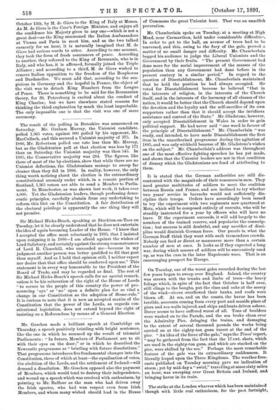On Tuesday, one of the worst gales recorded during the
last few years began to sweep over England. Inland, the country was strewn with the trunks and limbs of trees—the heavy foliage which, in spite of the fact that October is half over, still clings to the boughs, put the elms and oaks at the mercy of the wind—rivers overflowed their banks, and roofs were blown off. At sea, and on the coasts, the havoc has been terrible, accounts coming from every port and seaside place of piers and sea-walls injured, and ships and boats driven ashore.. Doverseems to have suffered worst of all. Tons of boulders were washed on to the Parade, and the sea broke clean over the Admiralty Pier, deluging the trains, and damaging to the extent of several thousand pounds the works being carried on at the eighty-ton guns turret at the end of the pier. " An idea of the force of the gale," says the Times' report,. "may be gathered from the fact that the 17 cwt. shots, which are used in the eighty-ton guns, and which are stacked on the pier, were shifted by the sea." Perhaps the most remarkable feature of the gale was its extraordinary suddenness. It literally leaped upon the Three Kingdoms. The weather fore- casts published on Tuesday morning gave no indication of storm ; yet by mid-day a " swirl," travelling at some sixty miles an hour, was sweeping over Great Britain and Ireland, and bringing havoc in its train.


































 Previous page
Previous page